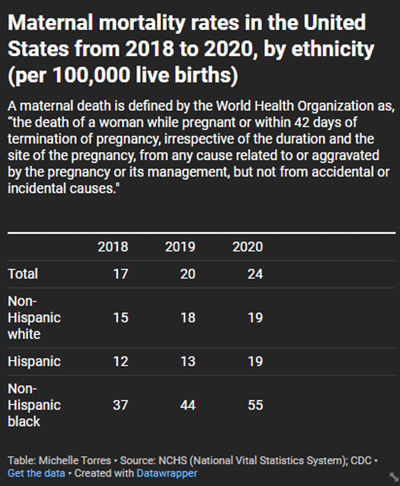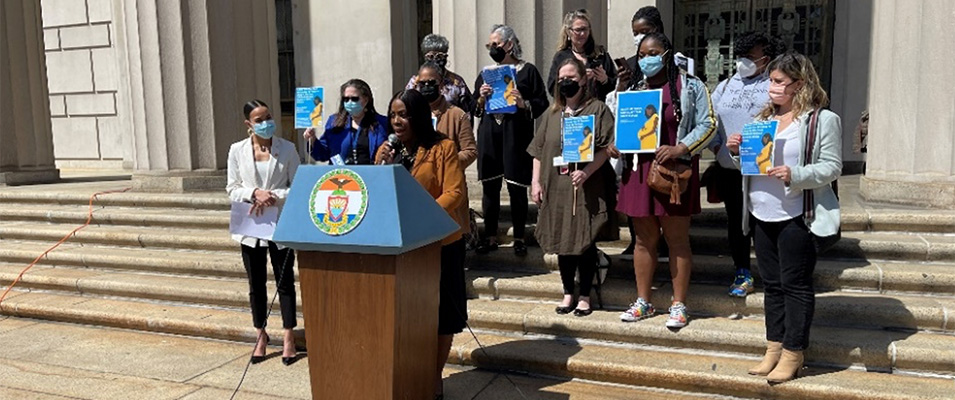By Michelle Torres
Black women have a much higher risk of injury and death during pregnancy than any other group. According to the CDC, Black women are two to three times more likely to die from pregnancy-related causes than white women and this disparity increases with age. The CDC cites multiple factors such as differences in quality of health care, underlying chronic conditions and racism. The problem has persisted for decades, says the CDC, and most pregnancy-related deaths are preventable. New York City data supports these findings and shows that the Bronx has the highest maternal morbidity of any borough. Black, non-Hispanic, women are 2.5 times more likely to have suffered a pregnancy-related injury.
Bronx Borough President Vanessa L. Gibson and birthing advocates are pushing for legislation that will change these statistics. “It is a fundamental right for every birthing person in our borough to receive quality, reproductive care,” Gibson said during a speech on April 13.
Gibson and birthing advocates made three recommendations, which they say will greatly improve pregnancy outcomes for all women but especially for those who most need it, Black women. These recommendations, outlined in Gibson’s speech are:
- New York should extend doula coverage statewide, on a permanent basis, and increase the reimbursement rate to match our peer states. As of December 2021, 17 states were offering or are on the path to providing statewide doula coverage through Medicaid.
- The New York State Department of Health should strictly enforce hospitals and other facilities’ compliance with health record sharing through the Regional Health Information Organizations (RHIOs) and SHIN-NY.
- The State should adopt the city`s Standards for Respectable Care at birth or comparable Standards, as a required notification of patient rights at all hospitals and birthing facilities.

Strictly enforcing hospitals and other facilities’ compliance with health record sharing and adopting the city`s Standards for Respectable Care at Birth or comparable standards, are measures that would take time to implement. Those changes may come too late for women who are currently or soon to be pregnant. However, the measure that stands out as having the potential to improve outcomes more quickly, is making access to doulas available to all birthing women and mandating that hospitals and clinics disseminate information on how they improve birthing outcomes.
According to DONA International, a doula is a trained professional who provides continuous physical, emotional, and informational support to a mother before, during and shortly after childbirth to help her achieve the healthiest, most satisfying experience possible. The National Library of Medicine has collected and reviewed many studies that show the benefits of doulas in pregnancy outcomes. They cite outcomes such as shortened duration of labor, less need for medical interventions and higher percentages of mothers who breastfed their babies immediately after birth. It seems obvious that women who have access to an experienced person to counsel and to assist with helping a mother begin breastfeeding, which can be difficult, is going to fare better than unassisted counterparts. But is there something else going on?
It is important to note that a doula is not a trained medical professional. Unlike midwives, they do not provide medical care, replace healthcare personnel, or perform any medical duties. So, what else might be making the difference for women who have doulas? Rina Rios is a DONA International doula with advanced certification who works with birthing advocacy organizations and trains doulas. She spoke about her experiences working with women in the Bronx.
Rios also volunteers her doula services for homeless teens. The homeless young women received better care than they would have received without one, she said. “When you bring a doula into a room where there is implicit bias in place and where there is systemic racism, or other systemic issues for other groups, that person is a witness, this laboring person came in with support where the person in the room next door might not have that and that alone is going to change the quality of care often,” said Rios.
One of the benefits of having a doula is having a knowledgeable witness, someone who knows how birthing should happen ideally. She is a pair or eyes and ears that can make sure everyone minds their P’s and Q’s. Even though doulas are present to support the mother, the intimation is there that if a birthing woman receives substandard care and something goes wrong, it will not be her lone word, should she survive, against an establishment practiced at defending themselves. This seems to be the factor missing from all the studies.
Routing out racism and implicit bias from the healthcare system seems as complicated and unobtainable as ridding our society of it. Healthcare workers are, after all people, and they bring their ideologies and prejudices with them to work each day. And structural racism, built into our establishments is hard to dismantle, it certainly can take years or decades.
The numbers don’t lie, and for Black women, the best hope for fair and proper care during their pregnancies and having the best birthing outcome, seems to be having a doula. Legislation to have doula services covered by insurance and Medicaid would be the fastest route to meaningful change in birthing outcomes.
To listen to the full interview with Doula, Rina Rios.



